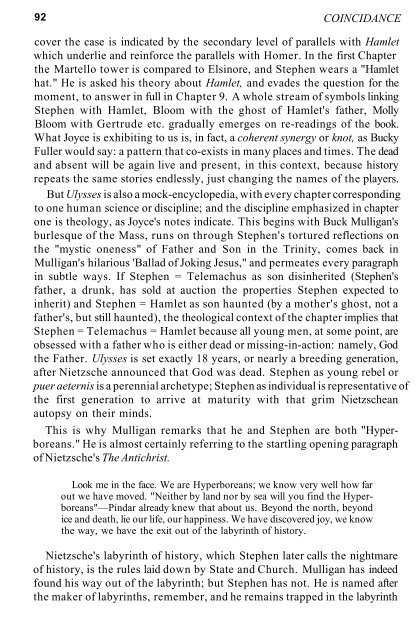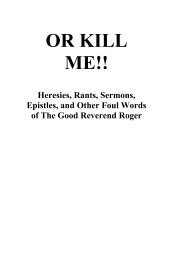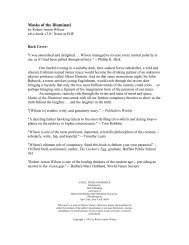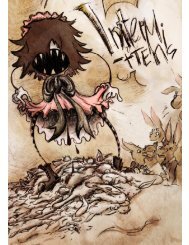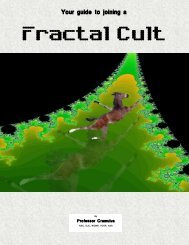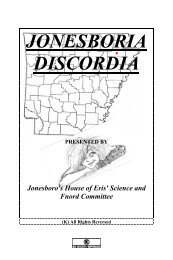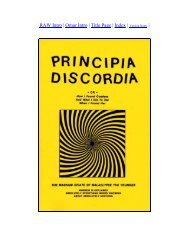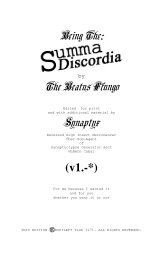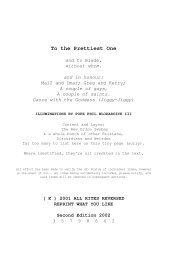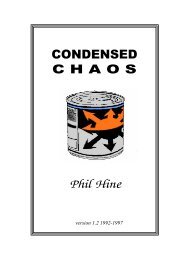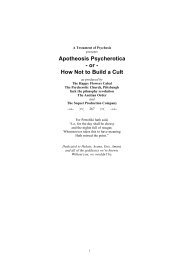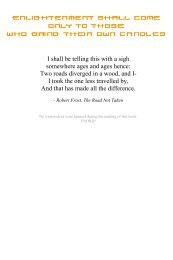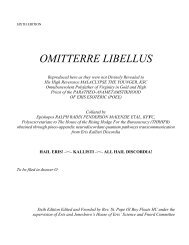Coincidance - Principia Discordia
Coincidance - Principia Discordia
Coincidance - Principia Discordia
You also want an ePaper? Increase the reach of your titles
YUMPU automatically turns print PDFs into web optimized ePapers that Google loves.
92 COINCIDANCE<br />
cover the case is indicated by the secondary level of parallels with Hamlet<br />
which underlie and reinforce the parallels with Homer. In the first Chapter<br />
the Martello tower is compared to Elsinore, and Stephen wears a "Hamlet<br />
hat." He is asked his theory about Hamlet, and evades the question for the<br />
moment, to answer in full in Chapter 9. A whole stream of symbols linking<br />
Stephen with Hamlet, Bloom with the ghost of Hamlet's father, Molly<br />
Bloom with Gertrude etc. gradually emerges on re-readings of the book.<br />
What Joyce is exhibiting to us is, in fact, a coherent synergy or knot, as Bucky<br />
Fuller would say: a pattern that co-exists in many places and times. The dead<br />
and absent will be again live and present, in this context, because history<br />
repeats the same stories endlessly, just changing the names of the players.<br />
But Ulysses is also a mock-encyclopedia, with every chapter corresponding<br />
to one human science or discipline; and the discipline emphasized in chapter<br />
one is theology, as Joyce's notes indicate. This begins with Buck Mulligan's<br />
burlesque of the Mass, runs on through Stephen's tortured reflections on<br />
the "mystic oneness" of Father and Son in the Trinity, comes back in<br />
Mulligan's hilarious 'Ballad of Joking Jesus," and permeates every paragraph<br />
in subtle ways. If Stephen = Telemachus as son disinherited (Stephen's<br />
father, a drunk, has sold at auction the properties Stephen expected to<br />
inherit) and Stephen = Hamlet as son haunted (by a mother's ghost, not a<br />
father's, but still haunted), the theological context of the chapter implies that<br />
Stephen = Telemachus = Hamlet because all young men, at some point, are<br />
obsessed with a father who is either dead or missing-in-action: namely, God<br />
the Father. Ulysses is set exactly 18 years, or nearly a breeding generation,<br />
after Nietzsche announced that God was dead. Stephen as young rebel or<br />
puer aeternis is a perennial archetype; Stephen as individual is representative of<br />
the first generation to arrive at maturity with that grim Nietzschean<br />
autopsy on their minds.<br />
This is why Mulligan remarks that he and Stephen are both "Hyperboreans."<br />
He is almost certainly referring to the startling opening paragraph<br />
of Nietzsche's The Antichrist.<br />
Look me in the face. We are Hyperboreans; we know very well how far<br />
out we have moved. "Neither by land nor by sea will you find the Hyperboreans"—Pindar<br />
already knew that about us. Beyond the north, beyond<br />
ice and death, lie our life, our happiness. We have discovered joy, we know<br />
the way, we have the exit out of the labyrinth of history.<br />
Nietzsche's labyrinth of history, which Stephen later calls the nightmare<br />
of history, is the rules laid down by State and Church. Mulligan has indeed<br />
found his way out of the labyrinth; but Stephen has not. He is named after<br />
the maker of labyrinths, remember, and he remains trapped in the labyrinth


